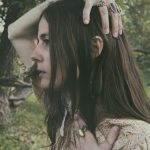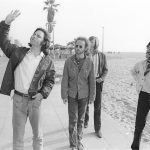How was the music scene in Norway at 60’s or 70’s?
Frokedal : Norwegian jazz was internationally acclaimed in the late 60s. There was also a strong folk scene with Norwegian lyrics in this period and popular music was on the rise: In the early 60s a big wave of young bands were covering – or pursuing a sound similar to – The Shadows. A lot of the lyrics were in Norwegian, but gradually as rock music became more popular more of the lyrics would be in english as well.
How do you describe Frokedal’s music to us? A few hints to Turkish listeners…
Melodic and minimalistic pop songs inspired by traditional music, 60s folk music and a little bit of rock ‘n roll. Before your solo career, you had played with bands such as “I Was A King” and “Harrys Gym”. But now you are in your own way. What kind of things changed in your way of making music? I think the sound is the biggest change. Harrys Gym played big indie pop, with a full drum kit and sequencer (computer tracks) combined with two synth rigs and myself playing on a double guitar amp. It felt like the idea that “more is more” was spreading around us and I guess I got a little sick of everything sounding very big and produced. For my solo project I wanted to focus on the core of the songs and put less stuff around it. I wanted to write pop songs that you could play anywhere and not depend too much on the equipment to communicate with an audience. So I ended up recording the music with two violin players from the traditional music scene, a keyboard player and a standing percussionist on two drums, velvet-underground style. I still play in I Was a King, and we are making a new album later this year.
What pushed you to make the change?
I am not from the traditional music scene myself, but one of my “hobbies” was playing playing traditional music from the Nordic countries and cajun/old time music from USA with my friends. And it started to inspire my own songwriting as well. I had been thinking about doing something more folk inspired on my own for a long time when Harrys Gym split up. And suddenly I had the right excuse to do it.
How did you feel yourself while recording your debut album -”Hold on Dreamer”?
It was actually a pretty easy album to make. I was used to fighting very hard for my ideas in the band, and suddenly it was just up to me to make all the decisions. I was still worried that I would be too easily influenced by other people’s opinions, so I didn’t ask anyone for advice along the way and I produced the album myself. And I made some rules for the recording so I wouldn’t get lost: Use few, important sounds in each song. Record the basics live in the studio so it doesn’t get too perfect. Try removing something instead of adding another layer to the music if something feels missing.
Although “Hold on dreamer” stands out as an album at the intersection of indie pop, folk rock and electronical sounds, it gives its attention to folk rock. How the album sound was shaped during the recording sessions?
The main parts for the songs (with the exception of Kid & Eclips that are based on beats) was recorded live in the studio with all of the musicians playing at the same time. I guess also the way we are using the violin as a key instrument for carrying the melodies, the chords and adding rhythm is important for the “folkiness” of the album as well. And since they are traditional musicians they don’t play in a sweet classical style, the expression is a bit rawer and more “rock” I would say. Also the many minimalistic drum parts, a result of stripping the drum kit down to only a snare and a floor tom, probably add to the folky feel with its tribal simplicity.
You worked with Jimmy Robertson in mixing process of “Hold on Dreamer”. Why did you choose Jimmy Roberson as the mix engineer?
I had worked with Jimmy before with other projects and he was the first engineer that made me feel at home in a studio. Communicating about music can be difficult. Some people use metaphorical terms and other people prefer to describe everything through technical terms. Jimmy understands both of these languages, but like me he is intuitive and we have a similar taste. In short: It is very easy and rewarding for me to work with him – and he makes my music better.
The sound of “Hold on Dreamer” is so ethereal for me. This clearly feel in songs such Eclipse, Demented Times and Cherry Trees. Can we say that these songs reflect your ‘dark side’? How do you describe your melancholic side?
I think you are right about these songs representing my melancholic side, and I did at times let that side loose on this album: The tendeny of brooding on whatever problems we’re facing rather than celebrating the good things that happen. But the album is hopeful too, or at least it is trying to be. “Demented Times” is actually about admiring someone who is the opposite. People who worry little and seem to find happiness wherever they go are very impressive to me.
How were the listener reactions for your debut “Hold on Dreamer”?
A few people have told me how Hold On Dreamer has been the glue that held them together through difficult days. I totally know that feeling of needing a certain song or album to be able to breathe, some of my greatest experiences as a listener have been like that. So that is probably the nicest thing anyone can say about my music. Some people like electric guitars, but find it hard to deal with the violin sounds, some find it strange that there is hardly any bass on the album, but I guess that is what you will get when radically changing your music.
What means 60’s and 70’s for you?
60s is beat music, the folk scene, great songwriting and dancing hippies. The 70s gave us glamrock, some really great synthesizers and my favourite album, John Cale’s Paris 1919.
Many of the critics identify your vocal with 60’s and 70’s cult female singers such as Nico or Joni Mitchell. Do you agree this?
I think they are both amazing singers, so I take that as a huge compliment. I don’t think I sound like any of them, but perhaps my voice is somewhere in the middle?
You just released your new single, called ‘Believe’. At this song, you have more electronic arrangements if I compare it to your previous releases. Will the new songs sound like this?
The new album has more variation in mood and energy. More anger and more hope. Except from using a full drumkit on a few more songs, the band is still the same people and the same instruments. But there are a couple of “rock” songs with fuzz guitar that have an itensity that I was longing to explore after making Hold On Dreamer.







